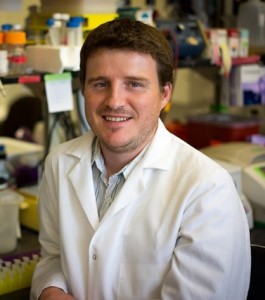Education and Training:
Teaching Postdoctoral Fellow, Biotechnology Program – North Carolina State University, Raleigh, NC (Dr. Robert M. Kelly)
Postdoctoral Research Associate, Virus-mediated Gene Delivery – University of North Carolina, Chapel Hill, NC (Dr. R. Jude Samulski)
Ph.D., Cellular and Molecular Biology – University of Wisconsin, Madison, WI (Dr. Daniel D. Loeb)
B.S., Molecular and Cellular Biology – Texas A&M University, College Station, TX
Research Interests:
My research investigates an emerging area of biotechnology, detection and identification of viruses in environmental samples. Viruses are continually circulating through our environment, infecting bacteria, plants and animals. Molecular biology tools allow us to test for these agents by the presence or absence of their genetic material. Such tools have implications for tracking human pathogens, but are powerful for detecting viruses of ecological significance as well. My work focuses on the genus Ranavirus. These viruses are similar to human poxviruses, but infect a broad range of amphibians, reptiles and fish. Their ecological impact is considerable. Ranavirus dispersal has been implicated as a contributing factor in the steep declines observed in amphibian populations around the world. Effective surveillance of these pathogens requires the development of sensitive and accurate means of detection. Projects in my group will advance in two primary directions. The first is development of PCR-based methods for amplification and quantitation of Ranavirus and host organism DNA from environmental samples. These experiments present the opportunity for field sample collection and testing. The second direction is study of the molecular biology of this genus of viruses. Understanding how the virus infects a cell and the molecular steps involved in this process. Toward this end, we work with Ranavirus isolates in amphibian cell culture. These studies are in early stages and will focus on assay development. However, this research will target species of interest, including listing as ‘threatened’ or ‘of concern’ by federal and state agencies. The goal of these studies is to further understand how these viruses are spread and contribute to animal disease and population decline.
Areas of interest: Molecular virology; Environmental DNA; Ectothermic animal cell culture
Contact:
tblentz@ncsu.edu
(919) 513-7685
Biotechnology Program
North Carolina State University
Campus Box 7512
6105 Jordan Hall
2800 Faucette Drive
Raleigh, NC 27695-7512


